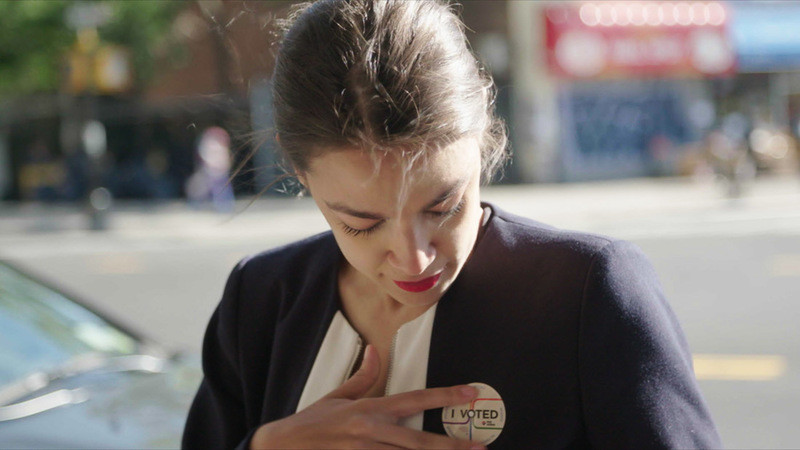
Every year, there’s some sort of catchphrase or theme that shows up on banners, bumpers and swag of the Sundance Film Festival. This time around, it was “Risk Independence,” a phrase that popped up in front of every movie and on many of the shirts at the gift shops. You could find the words on the jackets of volunteers as they scanned your ticket and on banners that waved from Park City’s light poles.
But you don’t have to look far from the screens at Sundance to see risks being taken, independence under threat and the fight to tell those compelling stories and to experiment with form and frame alike. One of the standout documentaries in this year’s crop of movies is a narrative and nonfiction hybrid about a group of activist DREAMers who risked deportation to infiltrate an immigration detention facility. Directors Cristina Ibarra and Alex Rivera painstakingly recreated what it was like for these two activists to purposefully get arrested to try and rescue an Argentinian father from what looked like certain deportation. Like a prison break in reverse, “The Infiltrators” documents their setbacks and clever methods to save others from losing their families. Although the story took place during the Obama Administrations, its poignancy has only grown in the light of the current administration's infamous separations of families and as more details of the inhumane conditions under which immigrants are detained are leaked.

While many movies at Sundance could be quite serious, Makoto Nagahisa’s offbeat entry, “We Are Little Zombies,” was anything but. The video game-infused movie follows four newly orphaned children who find each other at a funeral room and bond over their shared inability to cry after losing their parents. As a response to their situation and feeling dead inside, the group forms a band and embarks on a bizarre quasi-existential adventure about loss and grieving that brings them even closer together. The premise of Nagahisa’s feature debut can be summed up as “Funerals need more humor.” “We Are Little Zombies” is a visual funhouse, full of surrealistic images, lurid colors and lead by four cartoonishly very stoic leads. Although it’s around a two-hour movie, “Zombies” earns its runtime with exceedingly strange twists and a catchy Japanese-English soundtrack.

In a more conventional yet still thrilling vein, Hari Sama’s “This is not Berlin” is a clash of sex, drugs and punk music. In the movie, two best friends are introduced to Mexico’s burgeoning art scene in the '80s and are immediately hooked on the feeling of belonging. It was a place that allowed the boys to escape their macho high school trappings for something more experimental, a scene more permissive in terms of gender norms, sexuality and self-expression. “This is not Berlin” is a sexy misadventure through self-discovery and art that speaks directly to the misfits in the crowd who either went through a stage like this or wished such a place existed in their hometown.

In the middle of a program that included daredevil activists, emotionless zombie-like kids and aspiring provocateurs, Rachel Lears’ “Knock Down the House” premiered to a packed theater near the end of the first weekend. It was the documentary event many were talking about since the film’s subjects’ were to be in attendance, but the government shutdown ended in time to change New York Representative Alexandria Ocasio-Cortez’s travel plans. She would later Skype into the post-screening Q&A, but the mood at the premiere was no less dampened. The audience cheered when she appeared and when other Congressional hopefuls – Cori Bush of Missouri, Paula Jean Swearingen of West Virginia and Amy Vilela of Nevada – declared their intentions to run.
When the film dug deeper into why these women would want to put their bodies, mind, spirit and finances on the line to run a grassroots campaign, the audience responded emotionally to each of their stories. I’d never heard so many sobs and sniffles in a theater as I did at that premiere. People connected with Paula Jean tearfully remembering her coal miner dad and the cancer that took him too soon, of Cori’s frustration with her representatives who did little in the wake of Ferguson, of the tender way Alexandria remembered her dad and her hopes to make him proud and Amy’s tearful story of losing her daughter over a lack of health insurance. By the time the election scenes came around, emotions were even higher than when we first walked in. The audience understood the stakes, had seen the candidates’ awkward first steps into canvassing and were invested in seeing what happens next for each of the women. There would be more rounds of tears and cheers before the credits rolled, like an emotional pep rally. If these women who took risks and fought independently against complacency, why couldn’t you?
Monica Castillo is a critic, journalist, programmer, and curator based in New York City. She is the Senior Film Programmer at the Jacob Burns Film Center and a contributor to RogerEbert.com.





